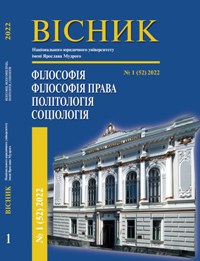LINGUISTIC ANALYSIS OF UKRAINIAN PRESIDENT VOLODYMYR ZELENSKYYʼS POLITICAL RHETORIC: STRATEGIES & TACTICS
LINGUISTIC ANALYSIS OF UKRAINIAN PRESIDENT VOLODYMYR ZELENSKYYʼS POLITICAL RHETORIC: STRATEGIES & TACTICS
Author(s): Mikhail Petrovich Trebin, Taisya Oleksiivna ChernyshovaSubject(s): Government/Political systems, Political behavior, Politics and communication, Politics and society
Published by: Національний юридичний університет імені Ярослава Мудрого
Keywords: political discourse; strategy for increase; strategy of theatricality; “wediscourse”; tactics of cooperation; tactics of irony; tactics of analysis“plus”;
Summary/Abstract: The purpose of the study is to characterize the discursive strategies and tactics of the Ukraineʼs President V. Zelenskyy. V. Zelenskyyʼs political discourse is mainly determined by the strategy for increase and the strategy of theatricality. The strategy for in- crease is used to create a positive mental space around oneself and oneʼs political force, so it is implemented through the tactics of analysis-“plus”, which involves analyzing the political situation without explicit approval of oneʼs contribution, with gratitude to ordinary citizens. The strategy of theatricality is realized through the tactics of cooperation, which explains the intention to identify with the people. Techniques here are the use of vocatives-ethnonyms and the inclusive pronoun “we”, which participate in the construction of “we-discourse” and “the communitization of responsibility”; reduced everyday communication in the format of storytelling; translingual speech practice. The tactics of irony is manifested in the use of irony against political opponents in order to self- position and create a “manipulative discourse of the positive”. V. Zelenskyyʼs presidential discourse is a complex speech formation, the characteristic features of which are: the format of reduced everyday communication in addressing the Ukrainian people; intention to show solidarity with the people in solving common problems; representation of the values of the youth linguistic community; dissemination of public messages through social networks; actualization in speech of physiological and social needs of people; performative function of irony.
Journal: Вісник НЮУ імені Ярослава Мудрого. Серія: Філософія, філософія права, політологія, соціологія
- Issue Year: 52/2022
- Issue No: 1
- Page Range: 193-209
- Page Count: 17
- Language: English

